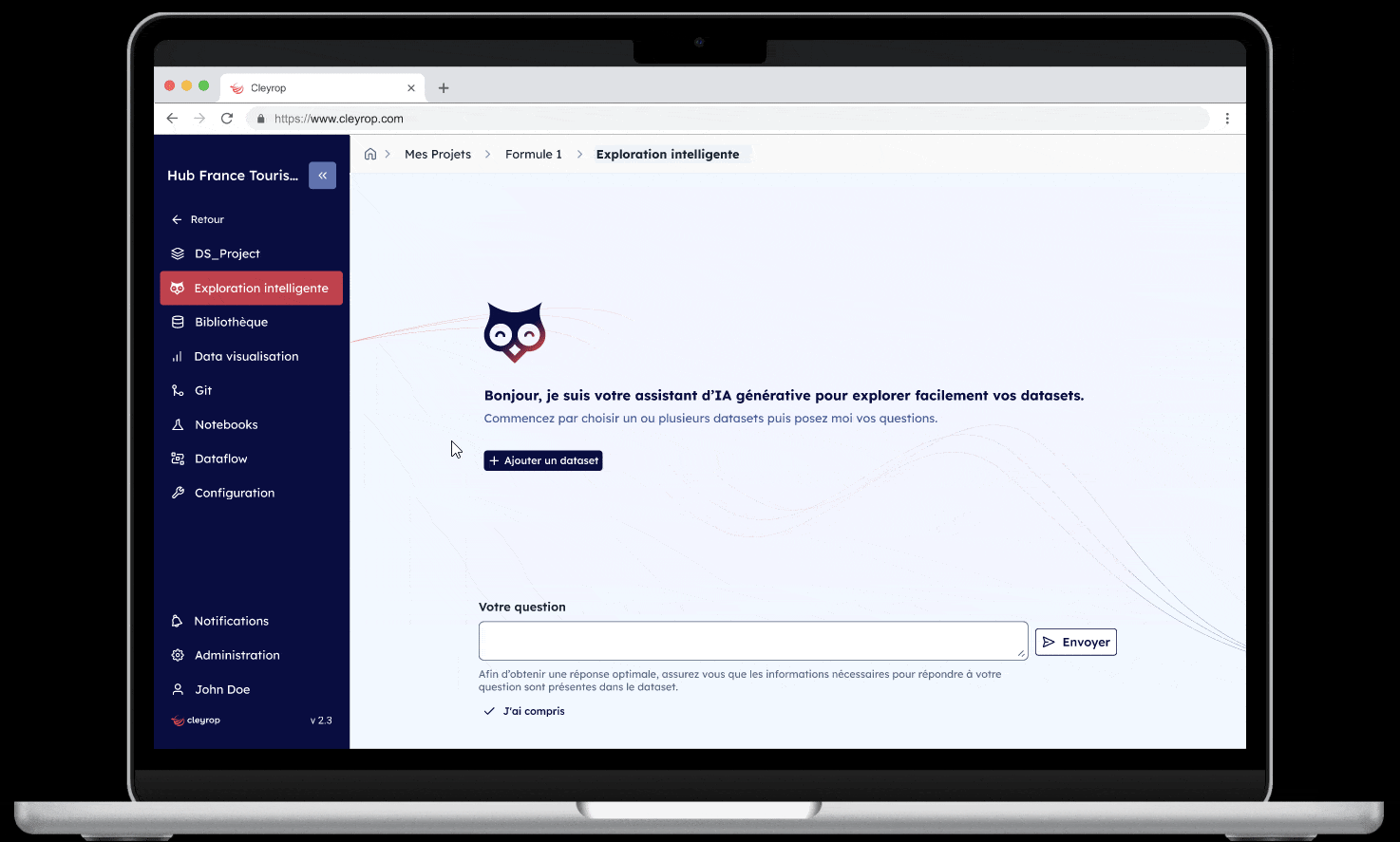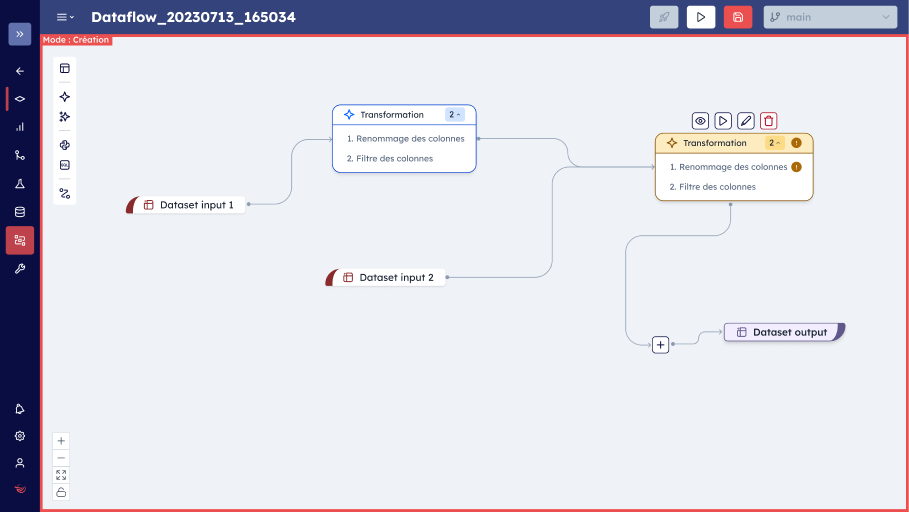LLMs, from exploration to multiplication of uses.
The year 2023 marked a significant new stage in the democratization of the uses of data and artificial intelligence, an acceleration largely due to the significant improvements in Large Language Models, or LLMs, both in terms of natural language understanding and text generation, and in terms of simplifying the user experience, as witnessed by the dazzling and popular success of Chat-GPT.
2024 will mark the industrialization phase of this fundamental trend, as well as its transition from an exploratory mode to a more contextualized use, to meet the operational needs of organizations in both technical and data teams, as well as business teams, to accelerate the valorization of their data assets. According to Gartner(1) , the development of LLMs will have an impact on data platforms, both in terms of how they operate (automation of the data transformation process, from ingestion to automatic workflow creation, while enabling better error detection) and how users interact with them (automatic query generation, personalized wizards, automatic generation of analyses, etc.).
No-Code / Low-Code, the cornerstone of the data-driven organization
By 2024, another fundamental trend will have reached its industrialization phase, infusing the various layers of the data lifecycle to accelerate the ability of companies to become increasingly data-driven in order to improve their performance and decision-making (2).
No-code / low-code functionalities enable transformation, cleansing, reconciliation and exposure operations to be carried out without any programming knowledge (no-code) or requiring first-level knowledge (low-code). These tools open up a new mode of collaboration between IT and business teams, and vast untapped potential by making data available to non-technical users. They make it possible to anchor and interweave data and AI in the day-to-day workings of business teams, making the use of data an integral part of the organization. If companies are to exploit the full potential of their data assets, they must become accessible and actionable for all. These technologies will also enable companies to overcome the lack of data science skills in their organizations. Gartner identifies low-code as an emerging market, set to grow by around 20% between 2024 and 2025(1).
The structuring and governance of data assets remain at the heart of democratization issues
La capacité à réduire le time-to-data des technologies de LLM et No-Code / Low Code sera néanmoins grandement dépendante de leur capacité à appuyer ces technologies sur un socle de données structuré et gouverné.
Pour tirer le maximum de ces nouveaux outils, les entreprises vont devoir continuer à :
- Eliminate silos and consolidate their data assets within a single catalog, with fine-grained rights and metadata management,
- Industrialize data processing to provide a reliable, usable training and query database,
- Improve collaboration to avoid duplication and make sure you’re working with the most reliable, up-to-date data possible,
- Offer the most intuitive display interface possible to make data more readily available to the end-user.
2024: Flash on our product ambition
Democratizing the use of data within organizations is Cleyrop’s primary mission. Our 2020-2023 roadmap focuses on building a unified Data platform covering the entire data lifecycle, from ingestion to visualization, to enable organizations to consolidate, structure and leverage their data assets. Today, our solution enables Data teams to accelerate the production of use cases required by business teams for steering and decision-making purposes.
This industrial base now enables us to focus our 2024 roadmap on data democratization functionalities, to enable these same operational teams to take direct control of the data and integrate it into their decision-making processes. Our roadmap is therefore based on a gradual ramp-up of these new functionalities from 2024 onwards:
LLM : A gradual ramp-up to accelerate and facilitate the use of data.
La plateforme Cleyrop va intégrer des fonctionnalités LLM afin de permettre d’accompagner les équipes Data, mais aussi les équipes métiers, dans les différentes étapes d’exploration et de transformation de la data. Concrètement, la plateforme Cleyrop va mettre à disposition des utilisateurs un assistant d’IA générative pour leur permettre, en langage naturel, de requêter directement un ou plusieurs jeux de données (dataset) pour rechercher ou vérifier rapidement des informations, croiser des sources de données, mener des analyses rapides… Ils pourront ensuite directement créer de nouveaux jeux de données, automatiser des traitements ou produire des visualisations impactantees via cet assistant intelligent, directement en langage naturel.
No-code – Low-code: Extending the uses of Business teams.
No-code / low-code functionalities will be added in 2024 to enable non-expert users to gain greater autonomy in their handling of data and its enhancement. They will be able to transform catalog data, create their own datasets and obtain the inputs they need for decision-making. This will make business teams, both business analysts and operational staff, more autonomous vis-à-vis data teams, and enable them, without any programming knowledge, to carry out their own data analyses. This will also enable data teams to do less run-around and concentrate on in-depth analysis or on improving the quality of your data.
OGMA : data at your fingertips
In collaboration with Ekimetrics, La Forge and CEA List, Cleyrop is working on a natural language knowledge base query tool for 2025. The OGMA project is the ultimate step in the democratization of data. Its aim is to enable end-users to extract data by querying directly in their own business language. OGMA’s generative AI will source all your company’s data assets and business documentation, in order to adapt to your jargon, acronyms and organization. All within a sovereign framework of trust. OGMA’s technology can be put to many uses in your day-to-day operations. For example, your business users will be able to directly query the Cleyrop platform as if they were talking to an employee:
- What impact will the closure of this store have on my EBITDA?
- What will my sales be after inserting process X?
- What is the carbon impact of Building Y?
Your challenge is to create value, exploit the potential of your data and keep control of it. Our role is to manage technological complexity to deliver a comprehensive, secure data platform with state-of-the-art functionality.
By covering the entire data lifecycle, we enable organizations to consolidate their data assets and industrialize their transformations. Our unified, secure solution is the foundation for optimizing the efficient use of no-code tools and large-scale language models (LLMs), guaranteeing enhanced performance in day-to-day business operations.
Références :
- 2024 Planning Guide for Data Management, October 2023, Gartnerr
- Mckinsey : The data-driven enterprise of 2025
- Gartner Forecasts Worldwide Low-Code Development Technologies Market to Grow 20% in 2023


